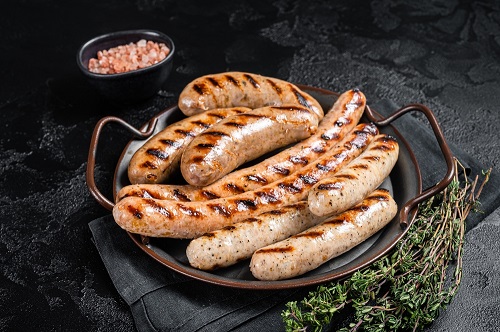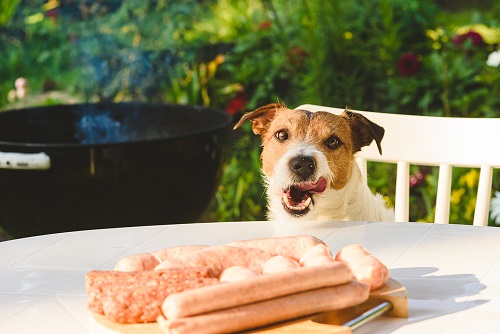Wondering Can Dogs Eat Bratwurst? Learn if you can serve your pet this tasty snack or should steer clear of them!
Listen up, folks! Can Dogs Have Bratwurst? Well, when it comes to bratwurst and our furry friends, we’ve got some important news to share. While that sizzling dish may tempt your dog’s taste buds, you must learn whether they are friendly for their gut or just another treat worth avoiding. This informative guide will sort out all your doubts!
What is a Bratwurst?

Bratwurst, a type of German sausage, finely minces pork, beef, or veal and season it with a blend of spices including salt, pepper, nutmeg, and other regional variations. People commonly grill or pan-fry bratwurst, as it offers a distinctive flavor and juicy texture.
People traditionally serve bratwursts on a bun or roll and enjoy them plain or with condiments such as mustard, sauerkraut, or grilled onions. They commonly associate bratwursts with outdoor grilling, festivals, and Oktoberfest celebrations, where they often pair them with beer.
Check out If Hummus is Safe for Dogs here
Can Dogs Eat Bratwurst?
No, dogs should not eat bratwurst.
Bratwurst is often heavily seasoned, which can cause digestive upset in dogs. Certain seasonings, like garlic and onion, can even be toxic to dogs, and the high levels of salt found in bratwurst can be detrimental to dogs’ kidneys and could potentially lead to salt poisoning.
Also, the high-fat content in bratwurst is alarming for dogs prone to obesity. Additionally, if cooked on skewers, it might pose another risk to dogs leading to serious internal injuries. While an occasional small bite might not harm a healthy dog, frequent feeding or large amounts can cause serious health issues. Always consult a veterinarian before introducing new foods to your dog’s diet.
Is Bratwurst Bad for Dogs—Potential Health Concerns

Feeding bratwurst to dogs is not at all recommended due to its heavy seasoning and other factors. Let’s learn about the potential health concerns in detail:
- Digestive Issues: The rich and seasoned nature of bratwurst can cause digestive upset in dogs, including symptoms like vomiting, diarrhea, and abdominal discomfort.
- Pancreatitis: The high fat content in bratwurst can increase the risk of pancreatitis in dogs.
- Sodium Overload: Bratwurst is often high in sodium, which can be harmful to dogs. Excessive sodium intake can result in sodium ion toxicosis in dogs, causing symptoms such as excessive thirst, dehydration, electrolyte imbalances, and potential damage to the kidneys.
- Seasonings and Ingredients: Many bratwurst varieties contain seasonings, spices, and ingredients like onions and garlic, which can be toxic to dogs. These ingredients can cause damage to red blood cells and potentially lead to hemolytic anemia or other health complications.
- Choking Hazards: If bratwurst is cooked on skewers, there is a risk of dogs swallowing the skewer accidentally, leading to choking or gastrointestinal obstruction. Ingestion of foreign objects can cause serious injuries to the digestive tract, requiring surgical intervention.
Can Dogs Eat Orange Chicken? Learn here
What to Do if Your Dog Eats a Bratwurst?
If your dog accidentally consumes a small amount of bratwurst, monitor them for any signs of gastrointestinal upset. Keep an eye out for symptoms like vomiting, diarrhea, abdominal discomfort, or a loss of appetite.
In cases where your dog consumes a large amount of bratwurst, experiences severe symptoms, or if the bratwurst contained ingredients that could be toxic to dogs (such as onions, garlic, or certain spices), contact a veterinarian immediately or seek emergency veterinary care.
Safe Sausages for Dogs

When it comes to sausages, it’s important to choose options that are safe and appropriate for dogs. Here are some safer alternatives to traditional bratwurst or sausages:
- Plain, Unseasoned Cooked Sausages: Ensure that the sausages you choose are free from spices, seasonings, and potentially harmful ingredients like onions or garlic.
- Turkey or Chicken Sausages: Look for sausages made from lean cuts of meats like turkey or chicken, as they can be a healthier option for dogs compared to pork or beef. Make sure these sausages do not contain added seasonings or high sodium content.
- Dog-Specific Sausages or Treats: There are many commercial options that provide sausages and treats that specifically meet the nutritional needs of dogs, formulated to be low in fat, with moderate sodium levels, and made from high-quality ingredients.
Is Teriyaki Chicken Bad for Dogs? Learn here
Unsafe Sausages for Dogs?
When it comes to sausages that are off-limits for our furry friends, we’ve got a list that should be kept away from their diet.
- Spicy or Seasoned Sausages: Sausages that are heavily spiced or seasoned, such as those containing chili powder, garlic, onion, or other spices, should be avoided. These ingredients can cause digestive upset and may be toxic to dogs, potentially leading to gastrointestinal irritation, hemolytic anemia, or other health issues.
- Processed Sausages: Processed sausages like hot dogs, bologna, or deli meats are often high in sodium, preservatives, and additives. These sausages can be detrimental to a dog’s health, as they may contribute to sodium toxicity, dehydration, and can contain unhealthy fats or artificial ingredients.
- Fatty Sausages: Sausages with high-fat content, such as those made from fatty cuts of meat or those with added fats like bacon or cheese, are not suitable for dogs. Consuming excessive amounts of fat can lead to pancreatitis, a serious inflammation of the pancreas that can cause severe abdominal pain, vomiting, and diarrhea.
- Raw or Undercooked Sausages: Raw or undercooked sausages carry the risk of bacterial contamination, including harmful bacteria like Salmonella or E. coli, which can pose health hazards for dogs. It’s important to ensure sausages are fully cooked to eliminate any potential pathogens before considering them as a treat for dogs.
Check out Can Dogs Eat Snickerdoodles? here
Quick Takeaways
So, Can Dogs Eat Bratwurst? It is not advisable to feed bratwurst or any seasoned sausages to dogs. These types of foods can contain ingredients that are harmful to dogs, such as onions, garlic, and excessive fat. It is always best to consult with your veterinarian regarding your dog’s diet and to provide them with dog-friendly and nutritionally appropriate treats. Your veterinarian can guide you on the best options to keep your dog healthy and safe.
FAQs
1. Can Dogs Eat Hot Dogs or Brats?
Hot dogs and brats are not considered healthy or nutritionally balanced food for dogs. They have typically processed meats with high levels of sodium, preservatives, and additives. Feeding hot dogs or brats to dogs on a regular basis can lead to obesity, gastrointestinal upset, and other health issues. While an occasional small piece of plain, fully cooked hot dog or bratwurst may not cause immediate harm to a healthy dog, it is best to choose healthier and safer treats and food options specifically made for dogs.
2. Can Dogs Eat Cooked Bratwurst?
Cooked bratwurst is generally safer for dogs compared to raw bratwurst since cooking can eliminate some bacteria and parasites that may be present. However, it is still not recommended to feed cooked bratwurst to dogs regularly due to its high fat and sodium content.
3. Can Dogs Eat Raw Bratwurst?
Raw sausages, including bratwurst, can contain harmful bacteria, such as Salmonella or E. coli, which can cause foodborne illnesses in both dogs and humans. These bacteria can lead to symptoms like vomiting, diarrhea, abdominal pain, and in severe cases, even more severe health complications.
